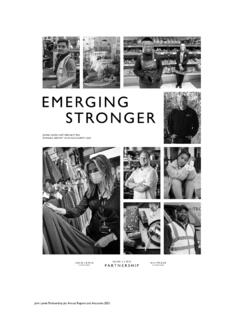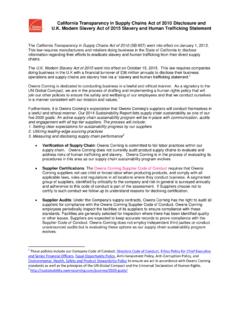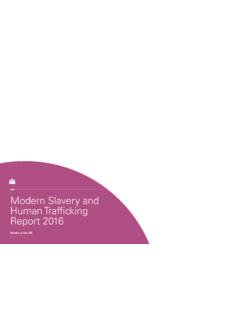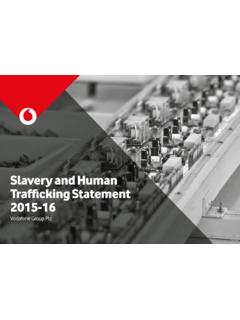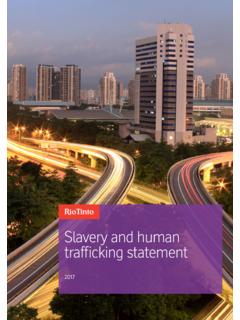Transcription of John Lewis Partnership plc – Human Rights and Modern ...
1 John Lewis Partnership plc Human Rights and Modern slavery Report 2016/17 This statement is made pursuant to Section 54 of the Modern slavery Act 2015. It constitutes our Modern slavery and Human trafficking statement for the 2016 calendar (and financial) year. Last year, the John Lewis Partnership published our first Modern slavery and Human Rights report. This year s report provides an update on progress over 2016 businessThe John Lewis Partnership operates 48 John Lewis shops across the UK, , 352 Waitrose shops, and business to business contracts in the UK and abroad. The business has annual gross sales of over 11bn. It is the UK s largest example of an employee-owned business where all 86,700 staff are Partners in the business. We sell 400,000 products sourced from more than 90 countries. There have been no material changes to our business operations over the past year. Our approachOur Founder, John Spedan Lewis , instilled a culture of acting with courtesy and kindness in the Partnership .
2 This extends not only to our co-owners, but to all those with whom we interact. Our approach to tackling Modern slavery is influenced by these business values. It forms part of our broader Human Rights strategy, through which we work to raise labour standards, improve working conditions and create fairly rewarded know that complex supply chains can pose greater risks for vulnerable workers and therefore much of our activity focusses on this area. Given the increased awareness and understanding of Modern slavery more cases are being exposed. A high profile example in the UK involved a factory supplying one of our suppliers (see page 7). We have learned from these cases to strengthen our approach and further protect vulnerable workers. We have taken the following actions:Policy and commitment We have updated our supplier Responsible Sourcing Code of Practice (RSCOP). This is aligned with revisions to the Ethical Trading Initiative (ETI) Base Code and makes clear reference to the Modern slavery Act.
3 Waitrose has worked with its strategic partner, Dalehead Foods, to help implement the RSCOP beyond tier one, in Waitrose livestock supply chains for the first diligence and risk assessmentWe have long established due diligence programmes in Waitrose and John Lewis to monitor implementation of our standards and drive improvements. Over 2016/17, we built a more detailed picture of risks in key supply chains, with Watirose s work with the Wilberforce Institute and John Lewis Model Factory Programme. We established a more robust compliance programme for Goods Not For Resale (GNFR). We have also supported the ETI on the development of their due diligence framework and are in the process of testing this in the Spanish agricultural sector. Awareness and collaborationWe have worked hard to raise awareness of Modern slavery and collaborate with others to find solutions for workers. Senior leaders in the business have engaged with policy makers and spoken on public panels to discuss risks and share best practice.
4 We have partnered with Just Enough UK to educate more than 9,300 primary school children about Modern slavery , to raise awareness of this issue over the long term. In higher risk areas, we also continue to champion Stronger Together, Fast Forward in the UK, and international initiatives such as Project Issara in , we have also trained teams on Human Rights across the business, from our central procurement function to John Lewis buying teams. Socio-political changesWe have continued to respond to changing political landscapes and are committed to working with our suppliers in these areas. For example, in Turkey, the Syrian refugee crisis is complicating a challenging labour Rights environment. In response to this, John Lewis , and other UK retailers have joined an ETI platform which aims to strengthen the industry s ability to address key Human Rights issues. Similarly, Thailand is a major sourcing country for shellfish retailers.
5 Waitrose extended its auditing programme in Thailand to gain more visibility of the seafood industry and to engage workers on the this statement and report we have tried to further increase transparency on the risks to workers, share insights that we have gained through our ethical trade programmes, and be clear about the steps that we have taken to protect vulnerable workers. Business cannot tackle Modern slavery alone, and so we are committed to working with a range of stakeholders to protect workers. Tackling Modern SlaveryTransparency in supply chains statement. Tracey Killen Director of PersonnelMore informationMore detailed financial and non-financial performance information including our Annual Report and Accounts can also be found our Responsible Sourcing Code of Practice more about due diligence on page 4 Read more about risks in our supply chain on page 6 Read more about our collaborations on pages 7, 8, 9 Read more about our business on page 3 John Lewis Partnership plc Human Rights and Modern slavery Report 2016/1712 J ohn Lewis Partnership plc Human Rights and Modern slavery Report 2016/17 Introduction to this 2016/17 updateThe John Lewis Partnership is a different kind of business.
6 A business where every employee is a co-owner. Through our democratic structures, journalism and communications channels, our Partners have a voice. We can challenge and influence business decisions and strategy. Acting with courtesy and kindness is a thread that runs through the Partnership and one that we look to extend to all the people that we interact with through our supply chains, in our shops and in our local communities. Respecting the Rights of these people is a key priority for our 2016, we published a full report which outlined our Human Rights strategy and plans. It covered our Partners, our customers and workers in the supply purpose of this report is not to repeat all the information that we included in 2016. It is to provide an update on progress against our plans, share transparent information about the issues and challenges we have faced, and exceed the requirements of the transparency in supply chains clause of the Modern slavery Act.
7 This update focusses on workers in our supply chains. The global nature of our supply chains and the diversity of products and services that we use and sell, means that this is where the greatest complexity, and therefore risks, lie. Our strategy and programmes address the most salient issues faced by workers and are delivered in those areas where we can have the greatest information about our Partners and customers can be found in our Annual Report and AccountsContentsTackling Modern slavery1 Introduction2 Our business3 Supply chain due diligence developments4 Overview of progress5 Understanding our supply chains 6 Protecting vulnerable workers7 Engaging workers8 Other key programmes9 Forward looking plans10 Index10In its pursuit of these business interests, the Partnership is influenced properly by considerations of Spedan Lewis ,Fairer Shares 1954 Improved governance and policy We have updated our RSCOP and extended its scope to cover Goods Not for Resale (GNFR).
8 Our Partnership and Divisional governance committees have shown leadership and commitment in overseeing our strategy and plans. Increased advocacy and engagementWe have engaged and communicated on Human Rights and labour standards internally, with our suppliers, and with our peers, on public platforms, with policy makers and, of course, with workers in our supply supplier collaborationSupplier engagement is integral to improving labour standards for workers and we have advanced our programmes and understanding of risks and salient issuesThrough our programmes, stakeholder engagement and further risk assessments we have gained a deeper understanding of the salient issues faced by workers at a more local the scope of our workWe have carried out further investigation into our raw materials supply chains, increased focus on GNFR and extended our due diligence requirements beyond tier one in key product areas.
9 Key developmentsTransparency Respecting Human Rights and tackling Modern slavery is about making clear commitments, progressing against those commitments and being honest about the challenges faced. This report is written in the spirit of transparency and acknowledges that while we have made progress, there are still areas on which we need to work. 3 John Lewis Partnership plc Human Rights and Modern slavery Report 2016/17 The John Lewis Partnership operates 48 John Lewis shops across the UK, , 352 Waitrose shops, and business to business contracts in the UK and have 86,700 Partners. Giving our Partners a voice is central to the principles of co-ownership and we are committed to promoting worker engagement through our supply chains. Engaging with workers provides them with an opportunity to shape and improve their working conditions. Our two divisions Waitrose and John Lewis depend on growers, manufacturers, packers, drivers and suppliers in the UK and around the world to bring great quality products to our customers.
10 However, given the different types of products that they sell their supply chains are very Partnership also works with agency, contract and temporary workers to provide essential support services and to help during peak trade periods such as Christmas and Black Friday. These workers are involved in IT, distribution, driving, cleaning and maintenance. In 2015 we carried out a comprehensive analysis of our operations and activities to better understand our potential areas of influence and impact. Following the UN Guiding Principles Reporting Framework we identified the most salient issues faced by workers, and developed our strategy to drive improvements in these areas. Throughout the report you will see how we have been tackling these issues through our programmes. The United Nations Guiding Principles The UN Guiding Principles (UNGP) on Business and Human Rights are a set of guidelines for companies to prevent and address negative impacts on Human Rights by issuesThe UNGP describes a company s salient Human Rights issues as those Human Rights that stand out because they are at risk of the most severe negative impact through the company s activities or business relationships.

